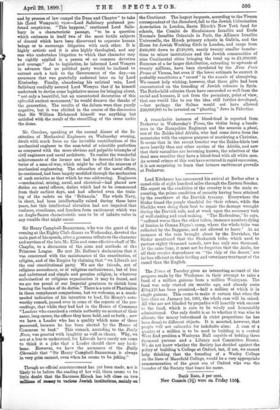Mr. Goschen speaking at the annual dinner of the In-
stitution of Mechanical Engineers on Wednesday evening, dwelt with much force on the invisible contributions of the mechanical engineer to the sum-total of scientific perfection as compared with the more obvious and palpable triumphs of civil engineers and naval architects. To realise the wonderful achievements of the former one had to descend into the in- terior of a man-of-war, which might be called the museum of mechanical engineering. The education of the naval officer, he continued, had been largely modified through the mechanism of suoh societies as that which he was addressing. Engineers —mechanical, mining, naval, and electrical—had placed new duties on naval officers, duties which had to be commenced from their earliest days, and had affected even the train- ing of the cadets on the 'Britannia.' The whole Navy, in short, had been intellectually raised during these later years, but this intellectual elevation had not impaired that coolness, steadiness, and freedom from excitement which was an Anglo-Saxon characteristic sure to be of infinite value in any trouble that might ensue.






















































 Previous page
Previous page